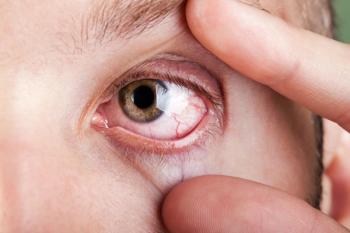
Vitamin A found useful for more than vision loss
Results from Age-Related Eye Disease Study have drawn attention to the role of nutritional supplementation in the management of eye disease.
Key Points
Houston-Results from the Age-Related Eye Disease Study have drawn attention to the role of nutritional supplementation in the management of eye disease. An evidence basis exists for its use in patients with retinitis pigmentosa, however. In addition, vitamin A deficiency should not be overlooked as an underlying cause of dry eye disease, said Jill Autry, OD, RPh.
Retinitis pigmentosa
Recommendations on the use of nutritional supplements for patients with retinitis pigmentosa (RP) are based on the results of prospective, randomized, controlled, parallel group studies where progression of retinal degeneration was monitored with electroretinography, visual field, and visual acuity testing.
"In a study evaluating nutritional supplementation for patients with RP, the annual rate of decline of visual field sensitivity loss was reduced by 40% to 50% among patients receiving vitamin A 15,000 IU/day compared with controls. This is a significant benefit considering the absence of any other treatments for RP," said Dr. Autry, adjunct faculty, University of Houston College of Optometry, and in private practice, Eye Center of Texas, Bellaire.
The recommendation for adding DHA for 2 years in patients who are just starting vitamin A supplementation is based on the results of a 4-year controlled clinical trial. In the overall study population, no significant difference was seen in the rate of retinal degeneration among patients receiving vitamin A palmitate plus DHA versus controls treated with vitamin A alone. Subgroup analyses found that among patients who had not previously used vitamin A, adding DHA slowed the course of RP progression during the first 2 years of the study. In addition, the subgroup analyses found that patients who had been using vitamin A for at least 2 years benefited with a slower decline in visual field sensitivity if they had a diet rich in omega-3 fatty acids.
"Based on the latter finding, RP patients who are not considered candidates for DHA supplementation may still be advised to obtain as much of this omega-3 fatty acid as they can in their diet through fish consumption," Dr. Autry said.
Vitamin A and dry eye
Vitamin A deficiency leading to severe ocular surface disease and scarring is a major cause of blindness among children living in developing countries where diet is poor. Even in the United States, patients occasionally may be encountered with ocular surface disease that is related to vitamin A deficiency. Several possible causes for vitamin A deficiency exist, Dr. Autry said.
"Primary vitamin A deficiency as a result of a poor diet does occur in this country among low income groups, abused children, or alcoholics. Vitamin A also may be lacking in certain stringent diets followed by vegetarians," she said.
"In addition, vitamin A deficiency can occur secondary to various malabsorption or storage conditions, including in persons with Crohn's disease, liver disease, pancreatic disease, or a history of intestinal or bariatric surgery," Dr. Autry added.
Severe xerosis and keratinization of both the cornea and conjunctiva should prompt consideration of the diagnosis of vitamin A deficiency, and it can be established by a simple blood test. Then, for correction of the vitamin A deficiency, patients should be referred to their primary medical doctor or other medical specialist who is providing care for their underlying condition. Patients with severe ocular surface disease also should be referred to a corneal specialist.
"Once vitamin A supplementation has been initiated, improvement in the condition of the ocular surface may be seen within days to weeks if there has not already been permanent scarring," Dr. Autry noted.
Newsletter
Want more insights like this? Subscribe to Optometry Times and get clinical pearls and practice tips delivered straight to your inbox.





